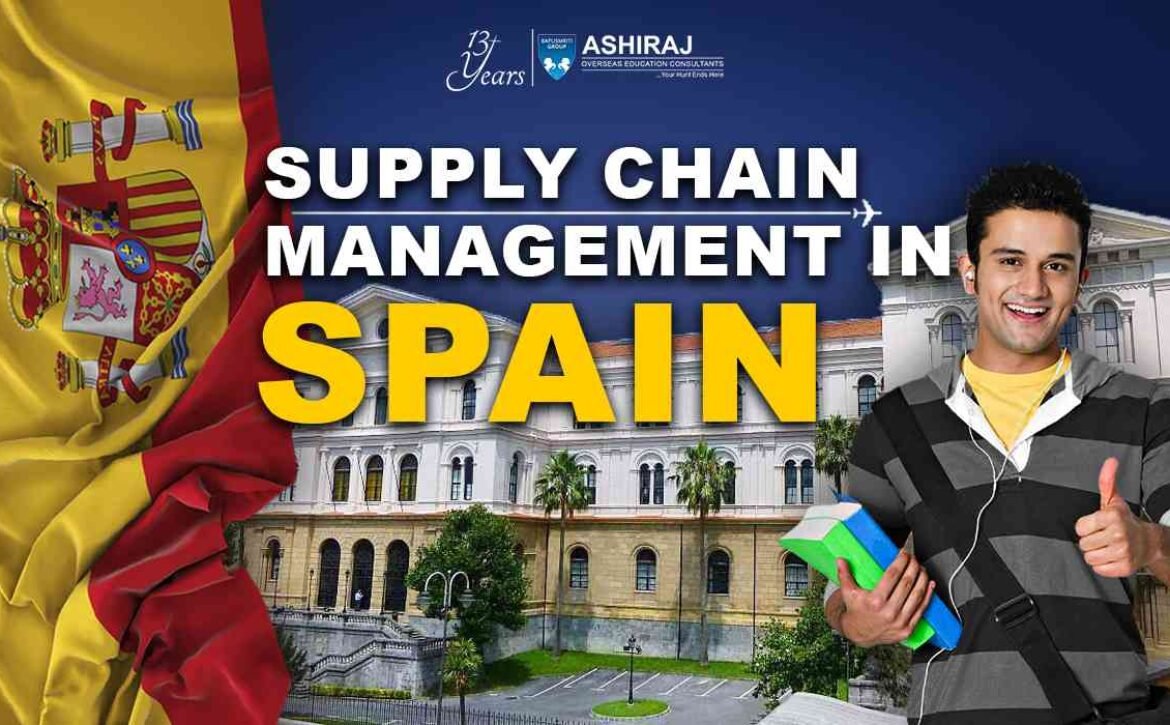
Supply Chain Management in Spain
Supply Chain Management in Spain is a critical aspect of the nation’s economy, characterized by its diverse industries and strategic geographic location. With its extensive network of ports, highways, and railways, Spain serves as a vital hub for logistics and transportation within Europe and beyond. From automotive manufacturing to agriculture and tourism, various sectors rely on efficient supply chain management to ensure the seamless flow of goods and services.
In recent years, Supply Chain Management in Spain has witnessed significant advancements, driven by technology adoption and process optimization. Companies are leveraging digital tools and analytics to enhance visibility, reduce costs, and mitigate risks across their supply chains. Moreover, Spain’s commitment to sustainability is influencing supply chain practices, prompting organizations to prioritize eco-friendly initiatives and ethical sourcing. As Spain continues to evolve as a global player in trade and commerce, effective supply chain management remains fundamental to sustaining its competitive edge in the international market.
Why to Study Supply Chain Management in Spain?
- Strategic Location: Spain’s geographical location at the crossroads of Europe, Africa, and the Americas offers unique opportunities for supply chain management students to understand global logistics dynamics.
- Diverse Industry Presence: From automotive to fashion and renewable energy, Spain hosts a diverse range of industries, providing students with exposure to various supply chain models and challenges.
- Advanced Infrastructure: Spain boasts modern infrastructure, including state-of-the-art ports, highways, and logistics facilities, offering students hands-on experience with cutting-edge supply chain technologies and practices.
- Cultural Immersion: Studying supply chain management in Spain allows students to immerse themselves in the country’s rich culture and history while gaining insights into global business practices.
- Language Advantage: Learning Spanish alongside supply chain management studies provides students with a valuable skillset for international business negotiations and collaborations.
- Sustainability Focus: Spain is increasingly emphasizing sustainability in its supply chain practices, offering students opportunities to explore eco-friendly initiatives and ethical sourcing strategies.
- Career Opportunities: With its robust economy and global connectivity, studying supply chain management in Spain opens doors to diverse career opportunities in both domestic and international companies.
- Networking Opportunities: Spain’s vibrant business environment and active industry associations provide students with ample networking opportunities to connect with professionals and experts in the field.
- Academic Excellence: Spain is home to several renowned universities and business schools offering top-tier supply chain management programs, ensuring high-quality education and training for aspiring professionals.
- Global Perspective: Studying supply chain management in Spain provides students with a global perspective on supply chain dynamics, preparing them for successful careers in the increasingly interconnected world of business and logistics.
Top Universities to Study Supply Chain Management in Spain
University | QS World University Ranking 2023 | Type of University | Average Annual Fees (EUR) | Programs Offered |
IE Business School | 15 | Private | €30,000 | Master’s in Supply Chain Management, MBA in Operations |
ESADE Business School | 20 | Private | €32,000 | Master’s in Global Supply Chain Management, MBA in SCM |
Universidad Autónoma de Madrid | 185 | Public | €1,500 – €3,000 | Master’s in Logistics and Supply Chain Management |
Universidad Carlos III de Madrid | 291 | Public | €1,500 – €3,000 | Master’s in Operations and Supply Chain Management |
Universidad Politécnica de Madrid | 401-410 | Public | €1,500 – €3,000 | Master’s in Industrial Engineering – Logistics and SCM |
Supply chain management in Spain is enriched by its top-tier universities offering specialized programs tailored to meet industry demands. Here’s a list of the top universities in Spain renowned for their supply chain management education:
- IE Business School: Ranked 15th in the QS World University Rankings 2023, IE Business School offers programs like Master’s in Supply Chain Management and MBA in Operations, with an average annual fee of €30,000.
- ESADE Business School: Ranked 20th globally, ESADE offers programs including Master’s in Global Supply Chain Management and MBA in SCM, with an average annual fee of €32,000.
- Universidad Autónoma de Madrid: With a QS rank of 185, this public university offers affordable programs like Master’s in Logistics and Supply Chain Management, with fees ranging from €1,500 to €3,000 per year.
- Universidad Carlos III de Madrid: Ranked 291st globally, this public university provides programs such as Master’s in Operations and Supply Chain Management, with similar affordable fees.
- Universidad Politécnica de Madrid: Ranked between 401-410 globally, this public university offers a Master’s in Industrial Engineering – Logistics and SCM, with fees ranging from €1,500 to €3,000 per year.
Course Curriculum for Supply Chain Management in Spain
- Core Concepts: The curriculum covers fundamental principles of supply chain management, including logistics, procurement, inventory management, and distribution strategies, ensuring a comprehensive understanding of the field.
- Technology Integration: Emphasis is placed on integrating cutting-edge technologies like blockchain, IoT, and data analytics into supply chain processes to optimize efficiency and decision-making.
- Global Supply Chain Dynamics: Students explore the complexities of global supply chains, including cross-border trade, international regulations, and cultural considerations, preparing them for roles in multinational corporations.
- Sustainability Practices: With Spain’s focus on sustainability, the curriculum includes modules on green supply chain initiatives, circular economy principles, and ethical sourcing strategies.
- Industry Case Studies: Real-world case studies and projects provide practical insights into supply chain challenges across diverse industries such as automotive, fashion, and food, enhancing problem-solving skills.
- Collaborative Partnerships: Collaboration with industry partners enables students to gain hands-on experience through internships, field visits, and guest lectures, fostering industry-relevant skills and networks.
- Risk Management: Students learn to identify and mitigate supply chain risks, including disruptions, geopolitical factors, and cybersecurity threats, ensuring resilience in dynamic business environments.
- Strategic Planning: The curriculum emphasizes strategic supply chain planning, demand forecasting, and inventory optimization techniques to enhance operational performance and competitiveness.
- Communication and Leadership: Courses focus on developing effective communication, teamwork, and leadership skills essential for managing cross-functional supply chain teams and driving organizational success.
- Continuous Improvement: The curriculum instills a culture of continuous improvement through methodologies like Lean Six Sigma, enabling students to streamline processes and drive innovation in supply chain management practices.
Eligibility Criteria & Admission Requirements for MS in Supply Chain Management in Spain
- Language Proficiency: Applicants must demonstrate proficiency in English or Spanish through standardized tests such as IELTS (International English Language Testing System) or TOEFL (Test of English as a Foreign Language). The minimum scores required vary by institution but typically range from 6.5 to 7.0 for IELTS and 90 to 100 for TOEFL.
- Academic Qualifications: Candidates are required to hold a bachelor’s degree or its equivalent from a recognized institution. Degrees in related fields such as business, engineering, or logistics are preferred.
- Standardized Tests: Some universities may require applicants to submit scores from standardized tests like GRE (Graduate Record Examination) or GMAT (Graduate Management Admission Test). The average scores accepted vary by institution, with GRE scores around 310-320 and GMAT scores around 600-650.
- Passport & Student Visa: International students must possess a valid passport and obtain a student visa to study in Spain. The visa application process typically involves providing proof of acceptance to a Spanish university, financial means, and health insurance coverage.
- Academic Certificates: Applicants must submit transcripts and academic certificates from previous educational institutions to verify their qualifications and academic performance.
- Work Experience: While not always mandatory, relevant work experience in supply chain management or related fields can strengthen an applicant’s profile and increase their chances of admission.
Test | Minimum Score |
IELTS | 6.5 – 7.0 |
TOEFL | 90 – 100 |
GRE | 310 – 320 |
GMAT | 600 – 650 |
Adhering to these eligibility criteria ensures that candidates possess the necessary skills and qualifications to succeed in Supply Chain Management in Spain, fostering a competitive and capable cohort of students.
Documents Required for Studying Supply Chain Management in Spain
- Passport: A valid passport is essential for international students applying to study Supply Chain Management in Spain, serving as proof of identity and nationality.
- Letters of Recommendation (LOR): Typically, applicants are required to submit two or more LORs from academic or professional references attesting to their skills, character, and suitability for the program.
- Statement of Purpose (SOP): An SOP outlines the applicant’s academic and career goals, reasons for choosing the specific program, and how it aligns with their aspirations in the field of supply chain management.
- Curriculum Vitae (CV): A comprehensive CV provides an overview of the applicant’s educational background, work experience, skills, achievements, and extracurricular activities relevant to Supply Chain Management in Spain.
- Official High School Transcripts: Transcripts from high school or secondary education institutions are required to verify academic qualifications and eligibility for higher education programs.
- Supply Chain Management Certificates: Any relevant certificates or diplomas in supply chain management or related fields should be submitted to demonstrate specialized knowledge or skills.
- Work Experience Certificate: If applicable, a work experience certificate detailing the candidate’s professional experience in supply chain management or related roles may be required.
- Proof of Financial Resources: International students must provide evidence of sufficient financial resources to cover tuition fees, living expenses, and other costs associated with studying and living in Spain.
Ensuring the timely submission of these documents is crucial for a smooth application process and admission to Supply Chain Management programs in Spain.
Admission Process for Supply Chain Management in Spain
- Research: Explore universities in Spain offering supply chain management programs and review their admission requirements, curriculum, and faculty expertise in the field.
- Application Submission: Complete the online application form for your chosen university, ensuring all required fields are accurately filled out and necessary documents are attached.
- Document Submission: Compile and submit essential documents such as transcripts, standardized test scores (if applicable), letters of recommendation, statement of purpose, CV, and proof of financial resources.
- Language Proficiency: Demonstrate proficiency in English or Spanish by providing IELTS or TOEFL scores for English or Spanish proficiency tests for non-native speakers.
- Standardized Tests: If required, take standardized tests like GRE or GMAT and submit scores as per the university’s guidelines.
- Review Process: The university’s admission committee will review your application, considering academic qualifications, test scores, work experience, and other relevant factors.
- Interview (if applicable): Some universities may conduct interviews to assess applicants’ suitability for the program and clarify any aspects of their application.
- Offer Acceptance: Upon receiving an offer of admission, carefully review the terms and conditions, including tuition fees, deadlines, and enrollment procedures.
- Visa Application: For international students, apply for a student visa from the Spanish embassy or consulate in your home country, providing necessary documents and attending interviews if required.
- Preparation: Prepare for your journey to Spain by arranging accommodation, obtaining health insurance, and familiarizing yourself with the culture and academic environment.
Following these steps diligently will facilitate a successful admission process for Supply Chain Management programs in Spain.
“Education is the most powerful weapon which you can use to change the world.”
Nelson Mandela
Cost of Supply Chain Management Course in Spain
- Tuition Fees: Tuition fees for supply chain management programs in Spain vary depending on the university, program duration, and level of study. On average, annual tuition fees range from €10,000 to €30,000 for international students.
- Living Expenses: Accommodation, food, transportation, and other living expenses contribute to the overall cost of studying in Spain. Monthly living costs can range from €800 to €1,200, depending on the city and lifestyle choices.
- Books and Supplies: Budget for textbooks, course materials, and supplies required for your supply chain management studies, which can amount to a few hundred euros per year.
- Health Insurance: International students are typically required to have health insurance coverage during their studies in Spain. The cost of health insurance varies depending on the provider and coverage options.
- Visa Fees: Students from non-EU/EEA countries may need to pay visa application fees, which vary by nationality and visa type.
- Travel Expenses: Budget for travel expenses, including flights to and from Spain, as well as any additional travel within the country or to other European destinations.
- Extracurricular Activities: Participating in extracurricular activities, clubs, or cultural events may incur additional costs, although some universities offer free or discounted options for students.
Understanding and budgeting for these costs is essential for planning and managing finances while pursuing Supply Chain Management in Spain.
Scholarships for Supply Chain Management Courses in Spain
Scholarship Name | Amount | Application Deadline |
IE Foundation Scholarship | Up to €15,000 | Rolling Basis |
ESADE Excellence Scholarship | Variable | March 31st |
Universidad Autónoma de Madrid Scholarships | Variable | May 15th |
Spanish Government Scholarships | Variable | Varies |
Erasmus+ Scholarships | Variable | Varies |
Scholarships for Supply Chain Management in Spain offer financial assistance to students pursuing higher education in this field. Here are some prominent scholarships available:
- IE Foundation Scholarship: Offers financial aid of up to €15,000 to outstanding students based on academic merit and financial need. Applications are accepted on a rolling basis.
- ESADE Excellence Scholarship: Provides variable financial support to high-achieving students admitted to ESADE Business School’s supply chain management programs. The application deadline is March 31st.
- Universidad Autónoma de Madrid Scholarships: Offers various scholarships and grants to international students based on academic excellence and other criteria. The application deadline is May 15th.
- Spanish Government Scholarships: The Spanish government offers a range of scholarships for international students, including those pursuing supply chain management programs. Application deadlines vary depending on the specific scholarship program.
- Erasmus+ Scholarships: Erasmus+ offers scholarships and mobility grants to students studying in Europe, including Spain, to support their academic endeavors. The application deadlines vary depending on the mobility project and institution.
These scholarships provide opportunities for deserving students to pursue their studies in Supply Chain Management in Spain without financial constraints.
Career Opportunities After Supply Chain Management in Spain
Job Profile | Average Salary (EUR) |
Supply Chain Manager | €45,000 – €70,000 |
Logistics Coordinator | €30,000 – €45,000 |
Procurement Specialist | €35,000 – €50,000 |
Operations Manager | €40,000 – €60,000 |
Warehouse Supervisor | €25,000 – €35,000 |
Supply chain management in Spain offers diverse career opportunities with competitive salaries. Here are some common job profiles and their average salary ranges:
- Supply Chain Manager: Responsible for overseeing the entire supply chain process, from procurement to distribution, ensuring efficiency and optimization. Average salary ranges from €45,000 to €70,000 per year.
- Logistics Coordinator: Coordinates transportation, warehousing, and inventory management activities to ensure timely delivery of goods. Average salary ranges from €30,000 to €45,000 per year.
- Procurement Specialist: Manages sourcing and purchasing activities, negotiates contracts with suppliers, and ensures cost-effectiveness. Average salary ranges from €35,000 to €50,000 per year.
- Operations Manager: Oversees day-to-day operations, streamlines processes, and implements quality control measures to improve efficiency. Average salary ranges from €40,000 to €60,000 per year.
- Warehouse Supervisor: Supervises warehouse operations, including inventory management, storage, and shipping/receiving. Average salary ranges from €25,000 to €35,000 per year.
These career opportunities provide ample growth prospects and stability for professionals in the field of Supply Chain Management in Spain.
Frequently Asked Questions About Supply Chain Management in Spain
Some of the top universities in Spain offering supply chain management programs include IE Business School, ESADE Business School, Universidad Autónoma de Madrid, Universidad Carlos III de Madrid, and Universidad Politécnica de Madrid.
Yes, there are scholarships available for international students studying supply chain management in Spain. These include scholarships offered by universities, government scholarships, and programs like Erasmus+.
Most universities in Spain offering supply chain management programs require proficiency in either English or Spanish. Applicants may need to provide scores from standardized tests like IELTS or TOEFL for English proficiency or Spanish language tests for non-native speakers.
The average tuition fee for supply chain management programs in Spain varies depending on the university and program. On average, international students can expect to pay between €10,000 to €30,000 per year.
Graduates of supply chain management programs in Spain can pursue various career opportunities such as supply chain manager, logistics coordinator, procurement specialist, operations manager, and warehouse supervisor.
While work experience is not always mandatory, it can strengthen an applicant’s profile and increase their chances of admission, especially for competitive programs.
The duration of supply chain management programs in Spain varies depending on the level of study and program structure. Generally, master’s programs typically last one to two years.
Yes, many universities in Spain offer internship opportunities as part of their supply chain management programs, allowing students to gain practical experience and network with industry professionals.
Supply chain management professionals in Spain can find employment in diverse industries such as automotive, fashion, food and beverage, pharmaceuticals, and e-commerce.
International students can apply for student visas to study supply chain management in Spain by contacting the Spanish embassy or consulate in their home country and following the visa application process, which typically includes providing proof of acceptance to a Spanish university, financial means, and health insurance coverage.




